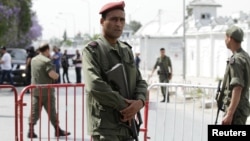The Islamic State group has claimed responsibility for a shooting rampage by a Tunisian soldier that left seven of his comrades dead and 10 others wounded Monday at a Tunis army barracks.
The shooting spree, by a sergeant named by officials as Mehdi Jaami, at a flag-raising ceremony at the Bouchoucha barracks came just two months after jihadists launched a terror attack on a landmark Tunis museum that left 22 dead.
According to eyewitness accounts, Jaami stabbed a fellow solider and grabbed his weapon, turning the gun on fellow soldiers before being shot dead himself. A colonel was among those killed.
This latest incident has Tunisians nervous and fearful of the impact it may have on already flagging tourism.
Following the shooting, Tunisian officials were quick to insist the bloody rampage had no links with terrorism, saying that 36-year-old Jaami had been suffering from a mental illness. He had family and psychological issues and had been, “banned from carrying weapons,” said defense ministry spokesman Belhassen Oueslati. He had been moved to a “non-sensitive unit” weeks before the assault.
“He had been high strung for weeks and had become undisciplined," said the spokesman, who described the incident as an "isolated act, not a terrorist act.”
IS affiliate claims responsibility
International media outlets have questioned the defense ministry claims while local newspapers have been readier to accept the official line. Doubts about defense officials’ explanation will be fueled by a statement posted Tuesday on a jihadist website in which North African extremists affiliated with the so-called Islamic State claim responsibility for the shooting.
In the statement Jaami is praised as a “lone lion.” The details of the attack posted on Afriqiyah Media matched those provided by Tunisian authorities.
In several recent terrorist attacks carried out by so-called “lone wolves” in France, America and Saudi Arabia, the Islamic State has claimed credit. Sometimes the links have been thin with the attackers swearing allegiance to the Islamic State just before carrying out an attack, allowing the extremist group to later brag of its involvement, despite the fact it hadn’t been involved in selecting the target or planning the attack, and was merely an inspiration from afar for the assailant.
The jihadist claim Tuesday offered no evidence of Jaami’s connections with the Islamic State or affiliated groups.
Even so, the shooting at the Bouchoucha barracks a short distance from where the March attack on the Bardo museum occurred is adding to mounting worries about jihadist violence. Since the Bardo museum assault, ordinary police officers have been allowed to patrol armed.
Surge in extremism
Tunisia has witnessed a surge in Islamic extremism with the assassination of two leading politicians in the past two years. The jihadist assassin of Tunisian secular party leader Mohamed Brahmi, who was shot dead in Tunis in 2013, said recently that Brahmi's murder and that of secular politician Chokri Belaid a few weeks earlier were designed to create chaos in the North African country.
Abu Muqatil at-Tunusi’s remarks in a propaganda interview in an issue of the Islamic State's English-language magazine Dabiq cast light on the chaos strategy behind the murderous assault at the Bardo museum, which spurred thousands of people onto the streets of Tunis to protest extremist violence in the country.
A terrorist group affiliated with the Islamic State claimed responsibility for the March Bardo attack. A five-minute audio message posted on YouTube in the name of Jund al-Khilafah, or Soldiers of the Caliphate, threatened Tunisian politicians, including the country’s president and prime minister.
Last December, the Tunisian jihadist Jund al-Khilafah announced its allegiance to ISIL. That pledge coincided with another video posted online by three Tunisian volunteers warning the country would not be secure “as long as Tunisia is not governed by Islam.” One of the fighters in the video was Boubakr Hakim, who is wanted in connection with the 2013 assassination of leftwing Tunisian politician Chokri Belaid.
Tourism
The threats and violence have had a big impact on tourism, a key economic sector for this North African country of 11 million. The large resort hotels complain of only 40 to 45 percent occupancy. The disorder and chaos in neighboring Libya adds to Tunisian worries. Officials fear violence there could spread. There is already evidence of two of the Bardo museum gunmen trained with jihadists in eastern Libya.
Monday’s incident triggered a high security alert across the Bardo district and adjacent neighborhoods with the country’s elite Counterterrorism Brigade deployed and sniffer dogs used to check parked vehicles for car bombs.
Mohsen Marzouk, political aide to President Beji Caid Essebsi, told reporters the shooting would likely “lead to a review of many aspects of security in Tunisian barracks.” Away from the capital, the army has been intensifying operations against jihadists in the remote Mount Chaambi area, where 70 members of the security forces have been killed in the past four years.
One of the biggest worries for Tunisian authorities is what impact jihadist fighters returning from Syria will have on the country. Despite its apparent success in making the transition to a moderate democracy, Tunisia has contributed more jihadist fighters per capita to the conflict in Syria than anywhere else, with authorities estimating that at least 3,000 Tunisians have joined either the Islamic State or al Qaida affiliate Jabhat al-Nusra. Five hundred are believed to have returned to Tunisia in recent months.




